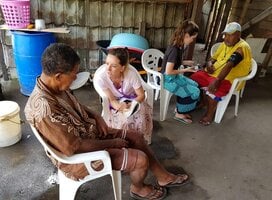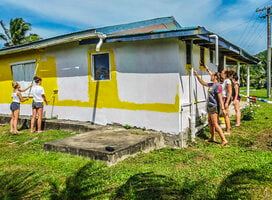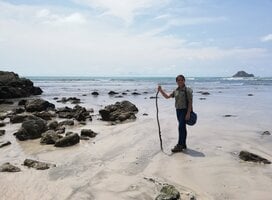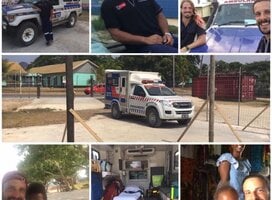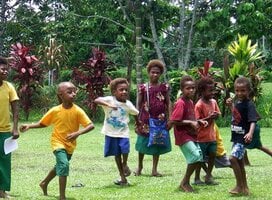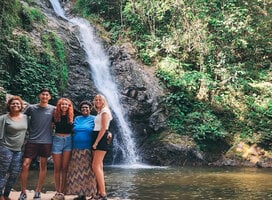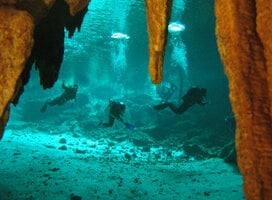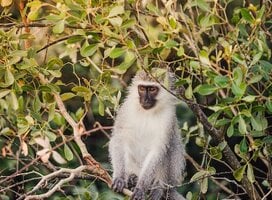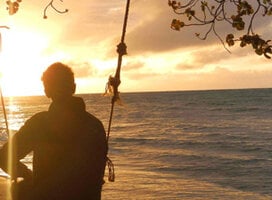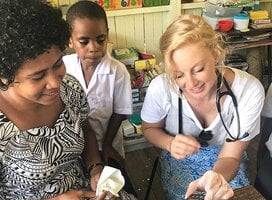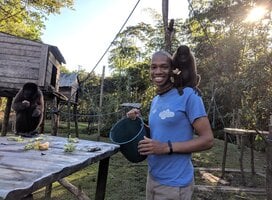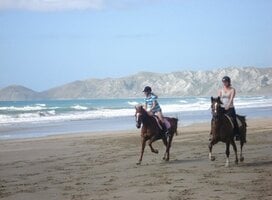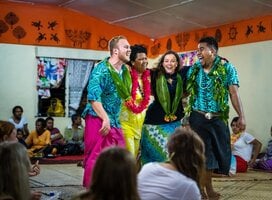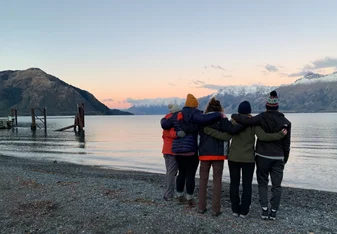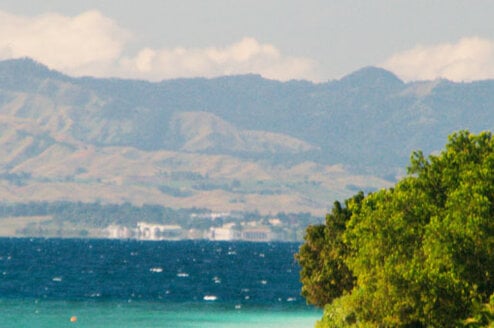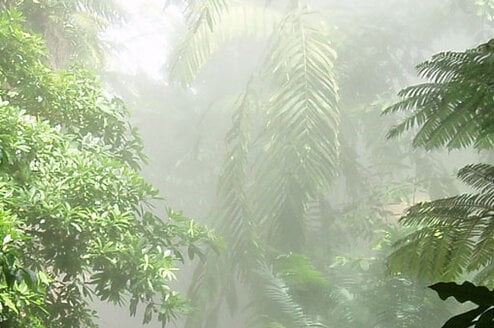Volunteer in Vanuatu
The Sand Master speaks as he draws his hand through the soil, spirals and loops emerging behind his finger. At first, the continuous line resembles a confused snake; but, as he finishes, the line connects both beginning and end, leaving a detailed pattern at your feet.
Sand drawing is an indigenous art form slowly disappearing from modern culture. The unique practice acts as storyline and historical record, bridging a communication gap between some 80 different language groups spoken over 83 islands. It is a complex practice that represents Vanuatu: built on layers of meaning and tradition, with seemingly isolated shapes that together form a picture so intricate, it must be experienced to be understood.
Outside of the capital city, Port Vila, life appears to be frozen in a previous century. Poverty and illiteracy are high, yet tourism and crime rates are low. Locals are honest and cheerful, deeply appreciating your help and friendship. And who needs running water when you’ve got some of the world’s clearest ocean as your front yard? Volunteering here is worth a sand story of your own.
Though volunteering opportunities will increase with the country’s modernization, a majority of placements currently occur in the fields of education, community development and conservation. Placements tend to run from a few weeks to a month; individuals wanting a long-term program should consider volunteering with international organizations, such as the Peace Corps.
Community Development:
Growing unemployment has caused many new issues for Vanuatu’s younger generation, including drug and alcohol addictions. Multiple grass-roots organizations such as Volunteer Vanuatu are tackling these problems from the ground up, working in small communities through awareness programs, drop-in shelters and youth change groups.
Both skilled and unskilled volunteers are needed; depending on the sensitivity of the placement, training may be provided. The work is often more mentally and emotionally challenging and part-time, with off-work hours to reflect and relax.
Youth Support/ Development/ Education:
Many of Vanuatu’s peoples attend primary schools, giving the country a literacy rate of roughly 95%. Unfortunately, costs and location deter many from continuing their education.
Volunteers are needed to staff rural schools and help fill this learning gap. Though not all programs require certified teachers, volunteers are expected to have adequate knowledge of a range of school subjects, such as math, science and English.
Accommodation and meals are usually provided by local hosts, reflecting the basic resources of the community. The work is usually full-time, with volunteers expected to participate in outside activities such as sporting and arts events.
Conservation (Environment/Marine/Wildlife):
The Hawksbill Sea turtle is a critically endangered animal that feeds and nests in the tropical waters off Vanuatu. Though over-fishing and pollution have threatened their survival, you can join efforts to study and protect the turtles in their native habitat.
Conservation volunteers will perform a range of tasks, from data collection to beach patrolling. Accommodation and meals are typically provided through host families, meaning program fees should stay within the community. The work is often physical and outdoors, with a portion of each day reserved for cultural exchange and exploration.
Because Vanuatu remains relatively untouched by international tourism, information on living and traveling through the country can require a bit of research. The following tips and tricks will help make your volunteer experience a positive one:
Requirements and Things to Know:
Christianity is heavily practiced, which influences many of Vanuatu’s conservative customs. Men and women should avoid wearing swimwear in public, and women should pack more t-shirts than skimpy tank tops and dresses.
Showing anger or annoyance will offend locals; instead, be patient and try to maintain a smile. Cultural norms are also determined by kastom, a set of taboos and traditions applied to daily life. Keep these in mind when interacting with locals.
The main spoken languages are English and French (due to prior European colonization) and Bislama, a sort of pidgeon.
Questions to Ask:
Because so many of your daily requirements – food, water, shelter – are dependent on your placement location, it’s smart to have an in-depth list of questions to ask your volunteer program.
First, double-check what’s accessible on the island for drinkable water, electricity and internet. Are meats, fruits and vegetables widely available, or will you need to bring your own from Port Vila’s markets?
Ask where the nearest hospital or health clinic is located, and what extra medications you should bring with (Aspirin, antihistamines, antibacterial creams, Tums, etc.)
As a welcoming gesture, find out what items are desperately needed in the community – notebooks, flip flops, t-shirts – and see if you can pack a few extra to share.
Health and Safety of Volunteers in Vanuatu:
Vanuatu is one of the safer Pacific Islands: within Port Vila, the tap water is potable, violent crime is uncommon and occurrences of malaria are extremely rare. However, the environment of many remote islands means volunteers will face different safety standards, depending on their placement location. Be sure to speak with your doctor regarding malaria medications, if you end up volunteering outside of Port Vila and check MD Travel Health.
Be extra careful during the wet season of December to May. Traveler’s diarrhea is the most common medical ailment, and can be prevented by cautious food and water intake.
Snakes and spiders are non-venomous, but avoid poisonous tropical sea life like the stonefish. And mosquito repellent is often your best form of defense for insect-borne diseases. It’s best to travel with a personal first-aid kit, as pharmacies and health clinics are sparse outside of Port Vila.
Contributed by Kelli Mutchler
